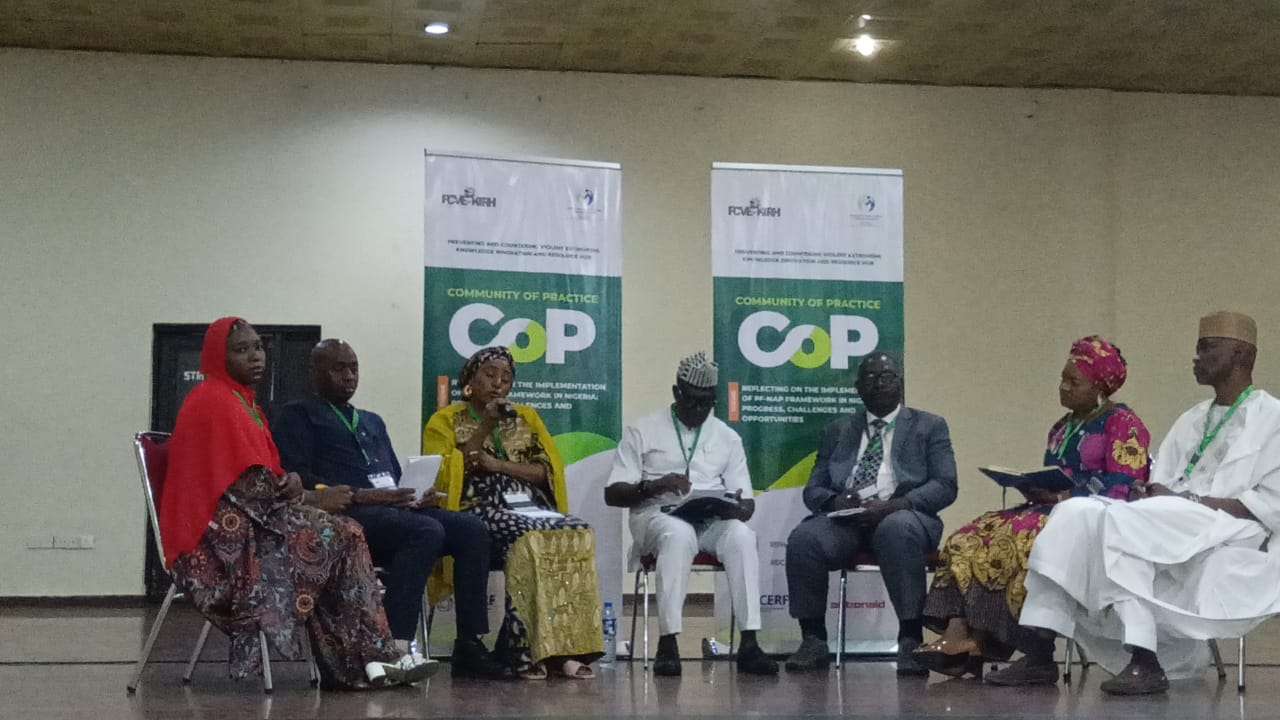Maureen Okpe
Stakeholders in the security sector have identified robust community relations and engagement, as well as collaboration with agencies and private organizations as ways to combat violent extremism and radicalization.
The experts emphasized the need to allocate formal authority to traditional rulers in the various communities in Nigeria, to timely address issues of violence as security agencies do not completely have the capacity to tackle the current insecurity and it’s underlying effects.
The stakeholders made the call in Abuja, at the Preventing and Countering Violent Extremism (PCVE) Knowledge, Innovation, and Resource Hub’s Community of Practice meeting, with theme, “Reflecting on the Implementation of PF-NAP Framework in Nigeria: Progress, Challenges, and Opportunities.”
Chair Practice, the Preventing and Countering Violent Extremism (PCVE) Knowledge, Innovation, and Resource Hub (KIRH) Development and Management Team, Jaye Gaskia, stressed the need to restore formal governance structures within Nigerian communities.
Gaskia advocated local association empowerment to adequately manage resources while allowing traditional institutions play a supervisory role.
He expressed dismay over the current practice of communities negotiating with bandits as a survival strategy to avoid incessant attacks from violent extremists.
This according to him, “could lead to organized crime becoming a sustainable livelihood. Yes, on the surface it looks like the communities are culprits, but it’s really because communities themselves have suffered.
“They pay taxes to these people… this creates competition among communities. We need to think community governance… let them become elected, have constitutional roles to properly manage the situation in the community.”
Reacting to the NBS report of N2.2.trillion spent on ransome, Gaskia noted that the report highlighted a growing trend of communities negotiating directly with criminal groups due to a lack of trust in security agencies.
This is as only 31% of kidnapping cases were reported to authorities, confirms that many believe law enforcement cannot act swiftly enough to secure the safe return of victims.
For her part, the National Coordinator, Global Community and Reliance Fund,(GCERF), Yetunde Adegoke acknowledged ongoing efforts by the federal government despite shocking statistics.
Adegoke said, “the statistics are quite shocking, we are aware of the growing problems, but I believe that government is aware of this and that is why we have been advised to scale up this community reliance.
“I will say that they are actually being proactive. The gap between federal, states, and the local governments are closing. The local government autonomy will provide opportunities also to bring governance closer to the people.
“I have seen that this government is very aware of the situation and is actually trying to put things in place to counter this. We as CSOs are trying to support that effort particularly from the non-kinetic side.
Adegoke also noted that, local government autonomy could enhance governance and address security issues more effectively.
“We’ve seen the kinetic with the military approach but it has to be matched by the non-kinetic, the information, the counter narratives governance issues need to be addressed. Because once you even get the Boko Haram surrendering, what do they go back to? What opportunities are there? What can they key into to help develop Nigeria.
Deputy Country Director ActionAid Nigeria,Suwaiba Muhammad Dankabo highlighted policy implementation gaps, emphasising the importance for continuous community engagement.
Delivering the keynote address, Director of Policy and Strategy, National Counter Terrorism Centre (NCTC), Major-General Adamu Laka, emphasised the importance of collaboration in addressing the ongoing threat of terrorism.
Laka, represented by Commodore Ahmed Madaki called for a united front against terrorism. He expressed gratitude to stakeholders for their commitment to the initiative, which aims to assess the implementation of Nigeria’s Policy Framework and National Action Plan for Preventing and Countering Violent Extremism (PF-NAP).
He noted that since its launch in 2017, PF-NAP has been instrumental in Nigeria’s response to violent extremism, aligning with global initiatives such as the United Nations Plan of Action.
Laka disclosed that significant progress has been made through partnerships with civil society, religious leaders, and traditional authorities. Adding, “Together, we are ensuring the long-term resilience and effectiveness of our criminal justice and security agencies,” he said.
Laka acknowledged issues such as resource constraints and socioeconomic inequalities that hinder progress. “The use of digital platforms by extremist groups for recruitment is a pressing concern,” he added.
He stressed the need for stronger local ownership and institutional support to sustain grassroots initiatives.
Looking forward, Laka identified opportunities to enhance counter-terrorism efforts through technology and innovation.
“Data analytics and AI can significantly improve our ability to counter extremist narratives,” he stated. He urged deeper collaboration among stakeholders, including international organizations and academic institutions, to leverage additional expertise and resources.
He said the upcoming review of PF-NAP offers a unique chance to incorporate lessons learned and address emerging threats. “Adopting local ownership through participatory planning at state and community levels will ensure sustainable progress.”
Laka reiterated that the Community of Practice serves as a transformative platform for sharing knowledge and promoting evidence-based approaches. “Achieving a peaceful and secure Nigeria requires our collective commitment.
“I urge all stakeholders to remain steadfast in your efforts to build a resilient future for all.”

